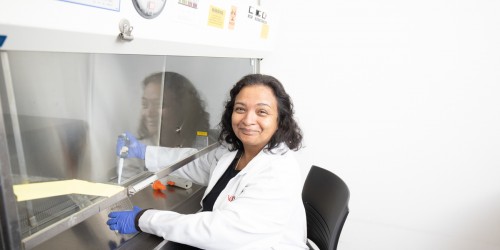
Developing innovative methods to improve healthcare
Lucy alumna Dr Soma Sengupta describes her groundbreaking research in neuro-oncology
PhD student Agnieszka Słowik tells us about her research and why she chose Computer Science
I have been interested in machine learning/AI research for a while before starting my PhD in Computer Science. I was captivated by the intellectual curiosity of AI, as well as interdisciplinarity of the field and the pace of change. At my undergraduate institution, I had limited opportunities, so I often had to take the initiative and go the extra mile in order to pursue research. This experience set me up well for doing a PhD.
I am currently working on reasoning and generalisation in intelligent systems. In my recent paper Exploring Structural Inductive Biases in Emergent Communication we studied these topics in the context of so-called multi-agent games with a communication channel. You can think of an agent as an algorithm, in our case a neural network. The game is played as follows: the first agent observes some object (for instance, a red square) and describes it to the second agent in a message. The second agent has to recognize the object among distractors (other geometrical shapes) based on the message from the first agent. We studied the ability of different types of neural networks to generalise to new combinations of familiar concepts (for example, if the agents learned to “discuss” and recognize a red square and blue circle, are they able to handle a red circle based on the experience with similar yet different objects).
The Artificial Intelligence group is very diverse in terms of people and research interests. Popular research directions lie at the intersection of machine learning and computational biology, as well as machine learning and automated reasoning. We have regular AI talks, seminars, discussion groups and women in CS initiatives. The people are very friendly and provide a great source of motivation. I am happy to serve as a representative of the AI group and I hope to become more involved after my internship at Mila.
I enjoy having access to a different environment than in my work life, and Lucy provides just that. There are other STEM students at Lucy Cavendish and I was able to connect with them thanks to the great social and sport life at Lucy, including bops, formals and yoga classes. Nautilus Cafe and the library are great places for work. I will never forget the late summer nights at the Lucy Cavendish Library when I was writing my first year report.
Based on my own experience and that of my friends, being a woman does make a difference when pursuing a career in science. At the early stage the challenges are more personal and subtle (building up confidence even if the environment is biased against you, setting boundaries in professional life), and later there might come challenges on the institutional level if one wants to combine starting a family with an academic career. On the bright side, things have been improving in the past years. For instance, we now have ‘Women in Machine Learning’, an international organisation that supports women in AI research. There is a lot of support for girls and women who want to follow this career path.
Our Admissions office is delighted to announce Lucy’s first ever, free ‘Women in Computer Science Experience Day’, that will take place on 6th May. Aimed at GCSE pupils in UK state schools who identify as female, this exciting event aims to give students the confidence to pursue Computer Science at university as well as inform them of the best A-level choices. Read more.